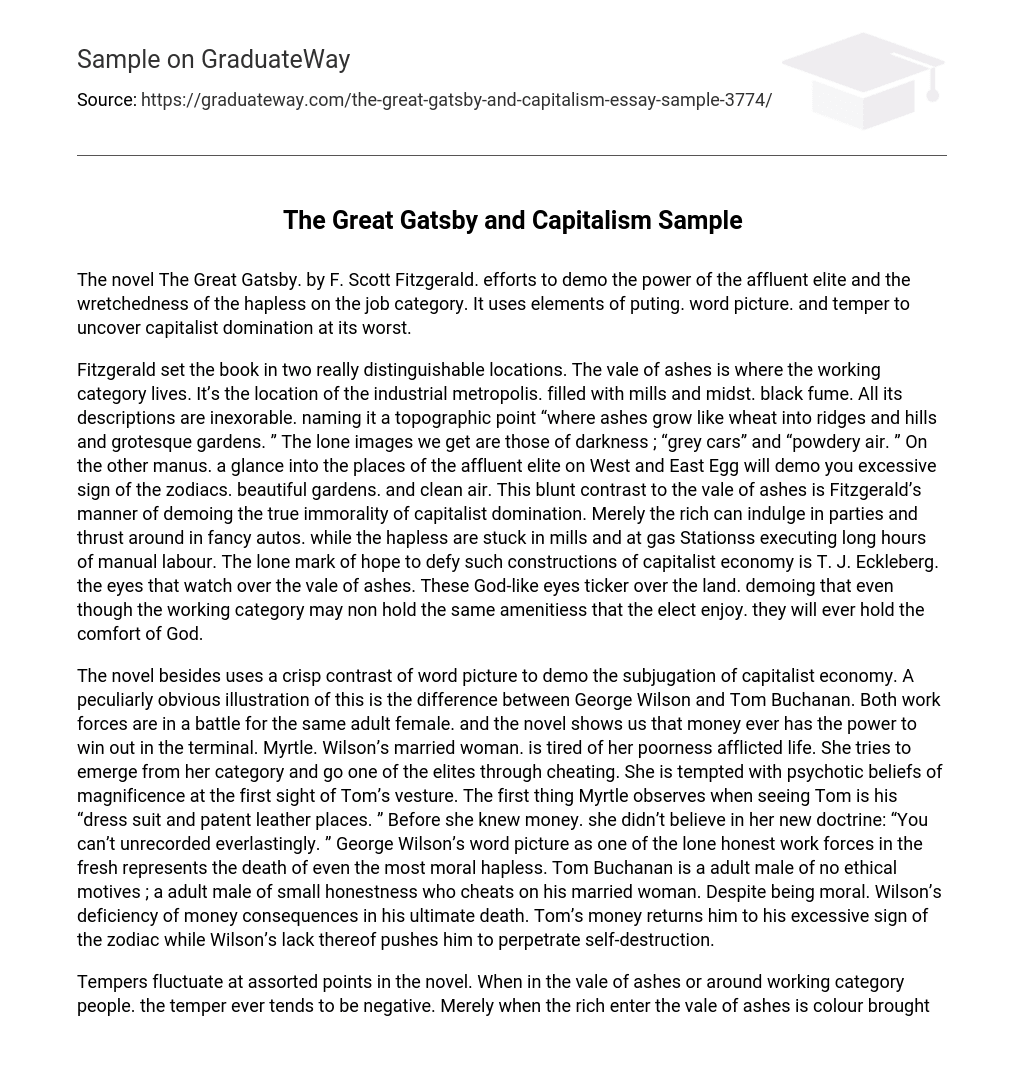The novel The Great Gatsby. by F. Scott Fitzgerald. efforts to demo the power of the affluent elite and the wretchedness of the hapless on the job category. It uses elements of puting. word picture. and temper to uncover capitalist domination at its worst.
Fitzgerald set the book in two really distinguishable locations. The vale of ashes is where the working category lives. It’s the location of the industrial metropolis. filled with mills and midst. black fume. All its descriptions are inexorable. naming it a topographic point “where ashes grow like wheat into ridges and hills and grotesque gardens. ” The lone images we get are those of darkness ; “grey cars” and “powdery air. ” On the other manus. a glance into the places of the affluent elite on West and East Egg will demo you excessive sign of the zodiacs. beautiful gardens. and clean air. This blunt contrast to the vale of ashes is Fitzgerald’s manner of demoing the true immorality of capitalist domination. Merely the rich can indulge in parties and thrust around in fancy autos. while the hapless are stuck in mills and at gas Stationss executing long hours of manual labour. The lone mark of hope to defy such constructions of capitalist economy is T. J. Eckleberg. the eyes that watch over the vale of ashes. These God-like eyes ticker over the land. demoing that even though the working category may non hold the same amenitiess that the elect enjoy. they will ever hold the comfort of God.
The novel besides uses a crisp contrast of word picture to demo the subjugation of capitalist economy. A peculiarly obvious illustration of this is the difference between George Wilson and Tom Buchanan. Both work forces are in a battle for the same adult female. and the novel shows us that money ever has the power to win out in the terminal. Myrtle. Wilson’s married woman. is tired of her poorness afflicted life. She tries to emerge from her category and go one of the elites through cheating. She is tempted with psychotic beliefs of magnificence at the first sight of Tom’s vesture. The first thing Myrtle observes when seeing Tom is his “dress suit and patent leather places. ” Before she knew money. she didn’t believe in her new doctrine: “You can’t unrecorded everlastingly. ” George Wilson’s word picture as one of the lone honest work forces in the fresh represents the death of even the most moral hapless. Tom Buchanan is a adult male of no ethical motives ; a adult male of small honestness who cheats on his married woman. Despite being moral. Wilson’s deficiency of money consequences in his ultimate death. Tom’s money returns him to his excessive sign of the zodiac while Wilson’s lack thereof pushes him to perpetrate self-destruction.
Tempers fluctuate at assorted points in the novel. When in the vale of ashes or around working category people. the temper ever tends to be negative. Merely when the rich enter the vale of ashes is colour brought into the universe of the on the job category. Myrtle’s cheerful attitude merely exists because of her desire to go forth George and his destitute life style. Fitzgerald changes temper like this to demo us that people view money as a signifier of felicity. Merely those who can see the true immoralities of hierarchal category constructions can see that money may convey felicity to some. but merely at the disbursal of many. The deceases of Gatsby and Myrtle at the terminal of the novel demo how bogus aspirations of wealth in society go incorrect because of money’s ability to pervert. Trying to go up the ladder of categories in a capitalist society will merely ensue in bad things.





